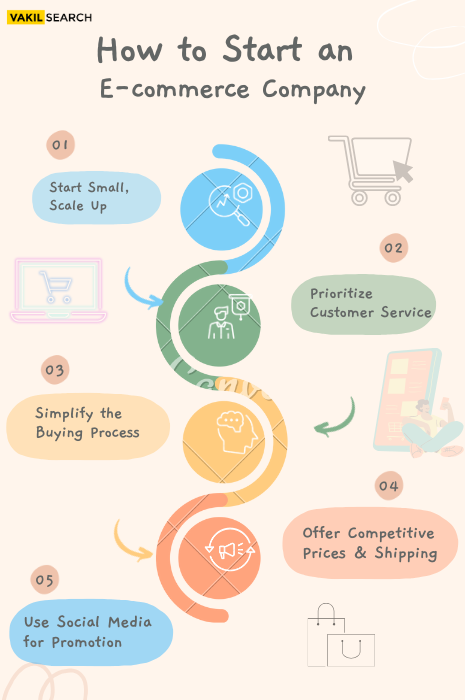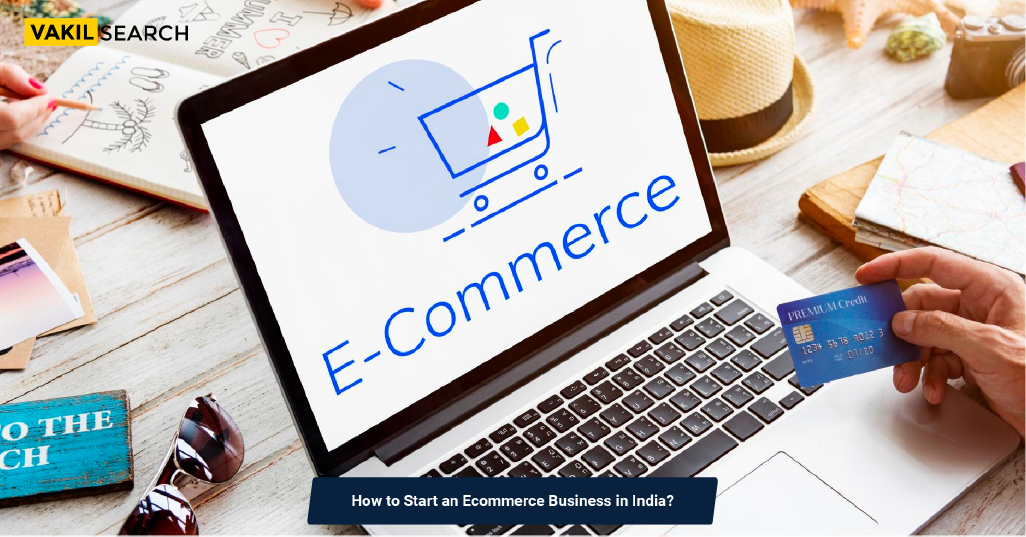E-commerce in India is a thriving industry with immense growth potential. Get an overview of the opportunities, regulatory requirements, and effective strategies
E-commerce Business in India
E-commerce in India has experienced rapid growth, driven by increasing internet penetration and changing consumer behavior. It offers diverse opportunities for entrepreneurs, from online marketplaces to niche e-commerce stores. However, navigating the complex regulatory environment and fierce competition requires a strategic approach. Adapting to evolving consumer preferences and ensuring reliable logistics and payment systems are key to success in this dynamic and promising industry.
Checklist to Start an Ecommerce Business in 2023
- Identify your niche: What type of products do you want to sell? What are you passionate about? What do you know a lot about? Once you understand your niche well, you can start to research your target market and identify potential competitors.
- Research other online businesses: Look at other e-commerce businesses in your niche. What are they doing well? What could they be doing better? This research will help you to develop a plan for your own business.
- Choose your product and target market: Once you understand your niche and your competition, you can start to choose the specific products you want to sell and the target market you want to reach.
- Validate your product: Before you launch your e-commerce business, validating your product idea is important. This means testing your product with potential customers to see if there is a demand for it. You can do this by conducting surveys, creating a landing page, or running a crowdfunding campaign.
- Decide how you’ll get your product: Once you have validated your product, you need to decide how you’re going to get it. You can either manufacture the product yourself, source it from a supplier, or use a dropshipping model.
- Write your business plan: A business plan is a roadmap for your success. It should include your business goals, strategies, and financial projections.
- Pick your business name and legal structure: Choose a business name that is unique and memorable. You will also need to choose a legal structure for your business, such as a sole proprietorship, partnership, or limited liability company.
- Apply for your EIN, permits, and licenses: Depending on your business structure and location, you may need to obtain an Employer Identification Number (EIN) and other permits and licenses.
- Create your online store: Choose an e-commerce platform to build your online store. There are many different platforms available, so be sure to choose one that is right for your needs and budget.
- Market your new business: Once your online store is up and running, you need to start marketing your business. There are many different ways to market your business, such as search engine optimization (SEO), social media marketing, and paid advertising.
How to Start an E-commerce Company?

Here are some additional tips on how to start an e-commerce company:
- Start small and scale up. Don’t try to do too much too soon. Start with a small selection of products and gradually expand your offerings as your business grows.
- Focus on customer service. Customer service is essential for any business, but it’s especially important for e-commerce businesses. Make sure you have a system in place to respond to customer inquiries quickly and efficiently.
- Make it easy for customers to buy from you. Your website should be easy to navigate, and your checkout process should be simple and secure.
- Offer competitive prices and shipping rates. Customers are always looking for the best deals. Make sure your prices are competitive and that your shipping rates are reasonable.
- Promote your e-commerce business on social media. Social media is a great way to connect with potential customers and promote your products. Be sure to post regularly and interact with your followers.
Tips for Starting an E-commerce Business:
- Start simple. Don’t try to do too much too soon. Start with a small selection of products and gradually expand your offerings as your business grows.
- Focus on customer service. Customer service is essential for any business, but it’s especially important for e-commerce businesses. Make sure you have a system in place to respond to customer inquiries quickly and efficiently.
- Make it easy for customers to buy from you. Your website should be easy to navigate, and your checkout process should be simple and secure.
- Offer competitive prices and shipping rates. Customers are always looking for the best deals. Make sure your prices are competitive and that your shipping rates are reasonable.
- Promote your e-commerce business on social media. Social media is a great way to connect with potential customers and promote your products. Be sure to post regularly and interact with your followers.
Cultivate a loyal customer base. This is one of the most important things you can do to ensure the long-term profitability of your e-commerce business. There are a number of ways to cultivate a loyal customer base, such as providing excellent customer service, offering loyalty programs, and creating a strong brand identity.
Invest in multichannel selling. This means selling your products on a variety of platforms, such as your own website, Amazon, eBay, and other marketplaces. Multichannel selling can help you to reach a wider audience and increase your sales.
Calculate startup costs efficiently with our business calculator. Our business setup calculator ensures accurate budgeting!
Are E-commerce Businesses Profitable?
Yes, e-commerce businesses can be profitable. In fact, the e-commerce industry is growing rapidly, and there are many opportunities for entrepreneurs to start and grow successful e-commerce businesses.
However, it is important to note that starting and running an e-commerce business is not easy. It requires hard work, dedication, and a willingness to learn. If you are serious about starting an e-commerce business, be sure to do your research and develop a solid business plan.
Here are some additional tips for increasing the profitability of your e-commerce business:
- Choose the right products to sell. Not all products are created equal. Some products are more profitable to sell than others. Do your research to identify products that have a high demand and a high-profit margin.
- Optimize your website for search engines. This will help you get more website traffic and increase your sales.
- Run paid advertising campaigns. Paid advertising can be a great way to reach your target audience and promote your products.
- Analyze your data and make adjustments as needed. It is important to track your sales, traffic, and other metrics so that you can identify what is working well and what is not. Once you have identified what is not working, you can make adjustments to your business strategy.
E-commerce Business FAQs:
What are the benefits of e-commerce?
The benefits of e-commerce include:
- Convenience: Customers can shop online from anywhere at any time.
- Variety: Customers can choose from a wide variety of products and services.
- Competitive prices: Customers can compare prices from different retailers.
- Convenience: Customers can have their purchases delivered to their door.
- Global reach: E-commerce businesses can sell their products and services to customers all over the world.
What is B2B in retail?
B2B in retail refers to business-to-business transactions. This means that the buyer is another business rather than a consumer. B2B e-commerce is a rapidly growing segment of the e-commerce industry.
What is a B2B company example?
Examples of B2B companies include:
- Office supply companies
- Industrial equipment suppliers
- Medical supply companies
- Food and beverage distributors
- Raw material suppliers
Is e-commerce the future?
Yes, e-commerce is the future of retail. The e-commerce industry is growing rapidly, and it is expected to continue to grow in the coming years.
Which type of e-commerce is Amazon?
Amazon is a B2C e-commerce company. This means that it sells products and services to consumers. Amazon is also a marketplace, which means that it allows other businesses to sell their products and services on its platform.
How much does it cost to start an e-commerce business?
The cost of starting an e-commerce business can vary depending on a number of factors, such as the type of business you want to start, the products you want to sell, and the size of your target market. However, you can expect to spend at least a few thousand dollars to get started.
How do I start an e-commerce business?
Here are the steps on how to start an e-commerce business:
- Choose your niche. What type of products do you want to sell? What are you passionate about? What do you know a lot about?
- Research your target market. Who are you selling to? What are their needs and wants?
- Choose your business model. Will you sell your own products, or will you source them from a supplier? Will you ship your own products, or will you use a dropshipping model?
- Create your online store. There are many different e-commerce platforms available, such as Shopify, WooCommerce, and Magento. Choose a platform that is right for your needs and budget.
- Promote your online store. There are many different ways to promote your online store, such as search engine optimization (SEO), social media marketing, and paid advertising.
Is it hard to start your own e-commerce business?
Starting your own e-commerce business can be challenging, but it is also very rewarding. If you are willing to work hard and learn, you can be successful. Here are some tips for increasing your chances of success:
Start small and scale up. Don't try to do too much too soon. Start with a small selection of products and gradually expand your offerings as your business grows.
- Focus on customer service. Customer service is essential for any business, but it's especially important for e-commerce businesses. Make sure you have a system in place to respond to customer inquiries quickly and efficiently.
- Make it easy for customers to buy from you. Your website should be easy to navigate, and your checkout process should be simple and secure.
- Offer competitive prices and shipping rates. Customers are always looking for the best deals. Make sure your prices are competitive and that your shipping rates are reasonable.
- Promote your e-commerce business on social media. Social media is a great way to connect with potential customers and promote your products. Be sure to post regularly and interact with your followers.

